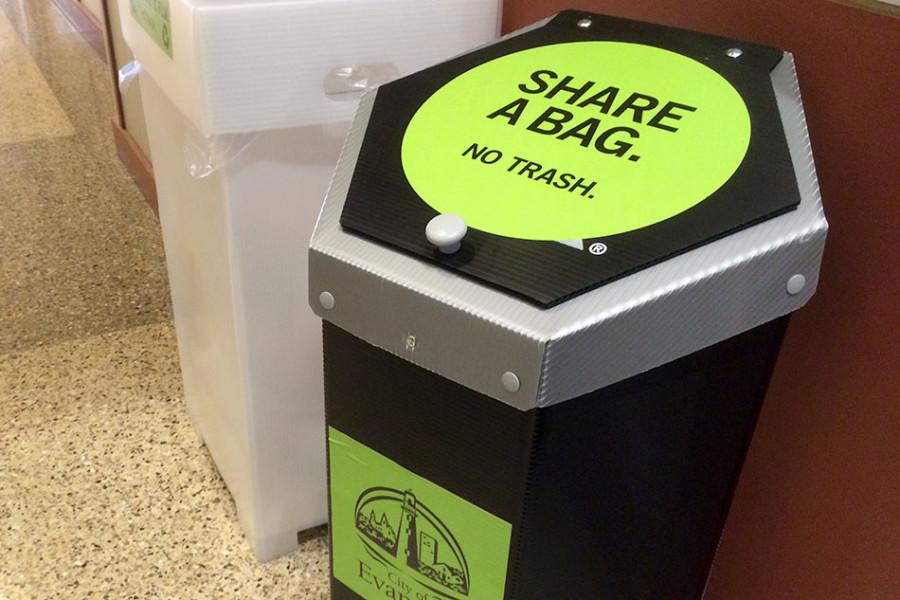Evanston aims to shift habits with upcoming plastic bag ban
Julia Jacobs/Daily Senior Staffer
As part of Evanston’s phase-out of plastic shopping bags in large retail stores, residents can pick up reusable bags and recycle plastic bags at 11 locations around the city, including the Evanston Public Library at 1703 Orrington Ave.
June 16, 2015
Shoppers will have to think ahead when heading to Evanston grocery stores this summer, as a city ordinance passed last year banning large retail stores from distributing disposable plastic shopping bags to customers takes effect Aug. 1.
To ease Evanston consumers into the transition, the city has launched a “Think Outside the Bag” initiative, which aims to help residents prepare to use alternatives to plastic shopping bags.
“When the ordinance was passed, the whole intention was that we wanted to have a year to spend on outreach to the businesses and to the communities,” said Catherine Hurley, the city’s sustainability manager. “Our hope is that through the campaign, consumers will work to bring their own reusable shopping bag and will transition to more of a reusable mentality.”
The campaign includes reusable “We Love Evanston” shopping bag giveaways, bag recycling locations and a bag-sharing program.
Giveaways are located at seven community centers and three libraries in the Evanston area until July 20. The same 10 locations plus the Fleetwood-Jourdain Community Center are also participating in the “Share a Bag” program, which allows Evanston residents to drop off extra reusable bags for other residents to use.
Additionally, community members can drop off their plastic grocery bags for recycling.
“A lot of people don’t know that plastic film shouldn’t go in the curbside recycling bin, but they’re excited to learn more, and that’s what our outreach is for,” said city sustainability fellow Kumar Jensen.
Jensen said reducing plastic bag waste will improve efficiency as well as environmental problems, as plastic bags that end up in recycling bins get stuck in the machinery at the recycling plant and need to be removed by employees.
The bag-banning ordinance arose out of the 2008 Evanston Climate Action Plan, which encouraged the city to look into taxes or bans on single-use plastic bottles and bags to discourage use, Hurley said. Discussion about a possible ban in 2011 did not lead to any decisions, but when Chicago passed a partial ban in April 2014, City Council revisited the issue, eventually passing the ordinance banning bags in July 2014.
Businesses affected by the ban — stores larger than 10,000 square feet — can still use paper bags, and customers can bring their own bags of any type.
Jensen said responses to the ordinance have been mostly positive, both from city residents and from the businesses affected by the ban. Affected businesses include large chain retailers such as Jewel-Osco, Marshalls, CVS and World Market.
Jewel-Osco spokeswoman Melissa Hill said although the ban is not ideal for the company from a business perspective, the company recognizes the community and environmental value of the ordinance.
“On one hand, it is a small increase to operating cost because the bags that comply with the regulations cost a bit more,” Hill said. “On the other hand, it’s always good to do anything we can to support not filling landfills with waste.”
Hurley said she hopes the campaign will help city residents adapt both to not receiving bags at major retailers and to being more conscientious about the waste they produce as well as ways to reduce it.
“Residents can start with bringing their own shopping bags now or saying no to a bag for one small purchase,” Hurley said. “Now’s the time to start getting in the habit and, like our program’s name says, ‘think outside the bag.’”
Email: [email protected]
Twitter: @MadelineFox14


